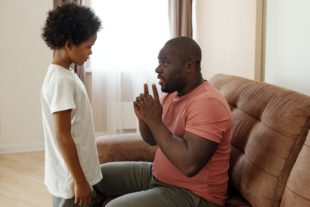Forgiving Others: Why Does it Matter?
Christian Counselor Spokane
When children are growing up, one of the first lessons that they learn is to say is, “I’m sorry.” They learn from a young age that when they do something wrong, there is a phrase attached to the end of the event in the form of an apology.
 Some people have this concept drawn out in front of them on a daily basis. Others are forced to apologize by the will of their caregivers, teachers, or spouses. However, still others are never taught to apologize nor do they ever witness apologies.
Some people have this concept drawn out in front of them on a daily basis. Others are forced to apologize by the will of their caregivers, teachers, or spouses. However, still others are never taught to apologize nor do they ever witness apologies.
For most of us, we have a general assumption surrounding the idea of forgiving others. Normally there are two or more people involved and the exchange includes something like “I am sorry” and “I forgive you.”
As children grow and their worlds become more and more complicated, so does the process of forgiving others. Forgiveness innately feels like a reciprocal process. There is a person (antagonist) who has wronged another, and there is a person (victim) who has been hurt.
The most common process of forgiveness taught to children unfolds with the antagonist apologizing for his mistake or wrongdoing and the victim being responsible for accepting the apology and extending forgiveness. The act is taught as a symbolic gesture for both parties to signify completion from the transgression.
This concept is held tightly as these children grow into adults. I hear this verbalized in my office with people lamenting about folks who have caused them offense but have not come to them for forgiveness, so they feel unable to forgive. Herein lies the trap with how children are taught and associate the act of forgiving others.
 The Apostle Paul wrote, “Bear with each other and forgive one another if any of you has a grievance against someone. Forgive as the Lord forgave you” (Colossians 3:13). The question becomes, “How does the Lord forgive?” It was written in the Old Testament, “You will again have compassion on us; you will tread our iniquities underfoot.
The Apostle Paul wrote, “Bear with each other and forgive one another if any of you has a grievance against someone. Forgive as the Lord forgave you” (Colossians 3:13). The question becomes, “How does the Lord forgive?” It was written in the Old Testament, “You will again have compassion on us; you will tread our iniquities underfoot.
You will cast all our sins into the depths of the sea” (Micah 7:19). At the center of our salvation, we find the idea of repentance and forgiveness. A sinner asks God to forgive him of his sins and repents for his misdeeds, and God extends forgiveness and everlasting life. Again, we see a reciprocal process of repentance and forgiveness.
In the New Testament, we find a new kind of forgiveness—one that did not rely on the symbolic gesture of asking and receiving. We read about Jesus taking the entirety of misdeeds, transgressions, and wrongdoings without being prompted by each individual personally responsible.
Jesus did not say, “Lord forgive them for they know what they do.” He asked for forgiveness for the things we were not sorry for and the multitude of offenses yet to be committed. He unilaterally forgave without being asked for forgiveness.
Two Types of Forgiveness
Dr. Tony Evans describes two kinds of forgiveness. There is both unilateral forgiveness and transactional forgiveness. Unilateral forgiveness occurs when you forgive someone and the person has not asked for it, requested it, or even repented of what they did to you. “Unilaterally” means that on your own, without their involvement, you choose to grant them forgiveness.
 Why would you grant someone forgiveness who doesn’t even want it and certainly doesn’t deserve it? The reason you grant unilateral forgiveness is so that you can keep going. Unilateral forgiveness keeps you from being held hostage to something the other person may never get right.
Why would you grant someone forgiveness who doesn’t even want it and certainly doesn’t deserve it? The reason you grant unilateral forgiveness is so that you can keep going. Unilateral forgiveness keeps you from being held hostage to something the other person may never get right.
It could be that the offense is so small that it is not a big deal to the other person, or it’s so small you don’t want to bring it up. Or maybe the person who hurt you has passed away and the opportunity for apologizing is no longer there (Evans, 2020).
The idea of forgiving others without being asked for forgiveness is a foreign concept for some and a pillar of strength for others. When you have been victimized and wronged it may feel impossible to let go of the pain without the process of understanding and healing through the dialogue and completion of a transactional apology and forgiveness event.
Our Heavenly Father forgives us once we have repented and accepted Him into our lives. And yet, when Jesus went to the cross, He forgave all the sins that ever were or were to come. Both unilateral and transactional forgiveness happened at once beyond the prism of time.
Many people have a garden in their minds that is carefully preserved and tended to. I refer to this as the garden of bitterness or resentment. As we walk through life, people do, say, and behave in ways that deeply wound and hurt us. We take those events and carefully find a place to plant the memory deep within our garden to signify the pain and contempt they have caused us.
We often return to the symbolic object and sulk with sadness or anger for the damage caused. We hold so tightly to the offense that it becomes part of our identity and shapes the way we react and solve new problems, circumstances, and dilemmas. We tend so fastidiously to our garden that we miss opportunities to achieve new goals and experience new adventures because of the anguish it cultivates.
 This can be seen in a person who was cheated on and now believes that they will always be cheated on. Or maybe a spouse who was lied to and believes their spouse will always be a liar. The fuller and more complex our gardens become, the more resentment and bitterness our lives manifest.
This can be seen in a person who was cheated on and now believes that they will always be cheated on. Or maybe a spouse who was lied to and believes their spouse will always be a liar. The fuller and more complex our gardens become, the more resentment and bitterness our lives manifest.
We become concrete thinkers and pessimists. The pain caused by one specific individual becomes the standard for how we perceive others’ intentions and actions.
For example, this is often played out with people who have been spurned by a romantic partner and begin making sweeping declarations about the opposite sex. Terms like, “all men are dogs” or “women are gold diggers.”
These statements then help solidify the pain that was caused by a singular event and transpose that pain in a broader way to help justify the immense hurt and discomfort the person is experiencing.
The negligent act of one person has the profound ability to cause arrested development in another and put growth and prosperity on a permanent pause. The silver lining in this exists within the person who was harmed. They alone can bypass the wrongdoer and choose forgiveness.
The act of forgiving others in the perfect world would consist of people face to face, exchanging words of repentance, understanding, and remission. Unfortunately, this world is beyond our own. We live in a world that grinds and turns with or without apologies.
Imagine if you will, a child walking through a forest who is being stuck by thorns. As he makes his way through the edge of the woods and into the meadow, the thorns are clearly protruding from his arms and legs.
You can see the immense pain that these thorns are causing, but the child will not remove them and insists that all plants have thorns and that they are all dangerous. You pity the child. You want to help remove the object of his pain. And yet, he is content with living in pain.
Unilateral forgiveness allows you to remove the thorns from your body. The pain of the wound will linger and might even increase when you remove the splinter. There might be a visible scar that never disappears. Forgiving others does not mean forgetting or complete healing. It means that you have chosen not to inflict pain upon yourself for the sake of the hurt that was placed upon you.
Christian Counseling for Forgiving Others
If you’d like help working through past pain or personal offenses you have experienced, I invite you to contact me or one of the other counselors in the counselor directory. Forgiving others can bring tremendous emotional and spiritual healing, which will in turn improve your overall physical and mental health.
“Sticky Note Apology”, Courtesy of Suzy Hazelwood, Pexels.com, CC0 License; “Scolding”, Courtesy of August de Richelieu, Pexels.com, CC0 License; “Planting”, Courtesy of Andrea Piacquadio, Pexels.com, CC0 License; “Overgrown Window”, Courtesy of Jack Gittoes, Pexels.com, CC0 License





